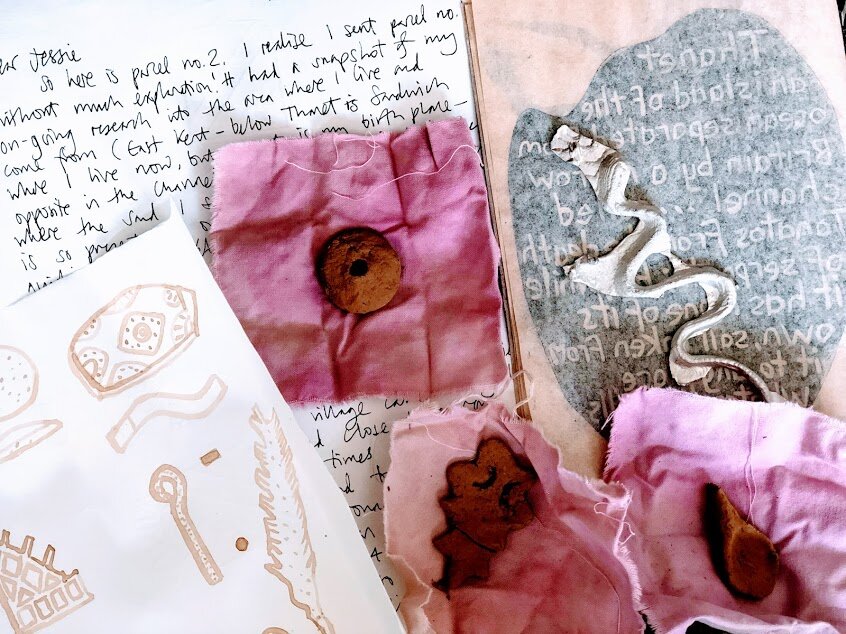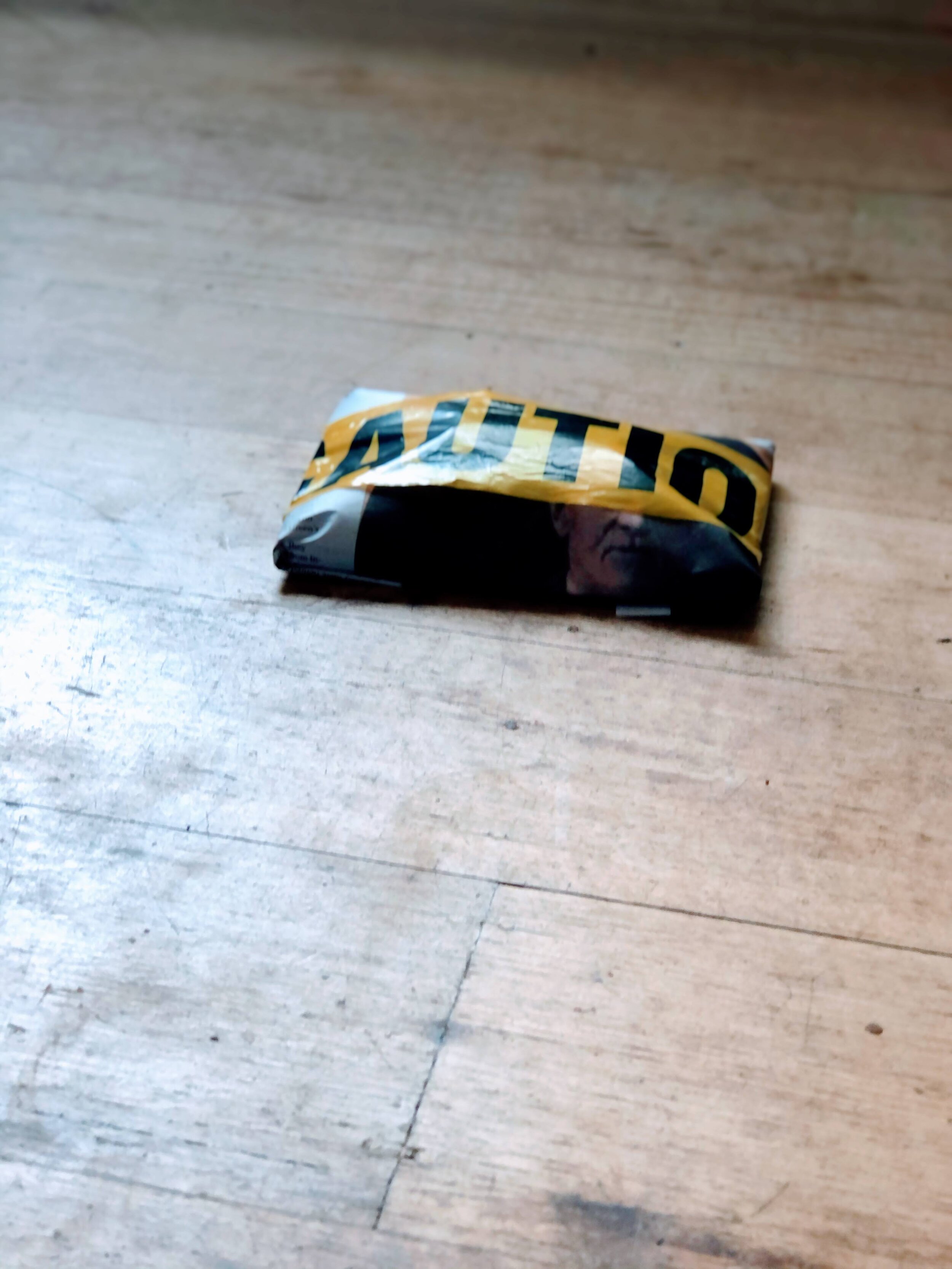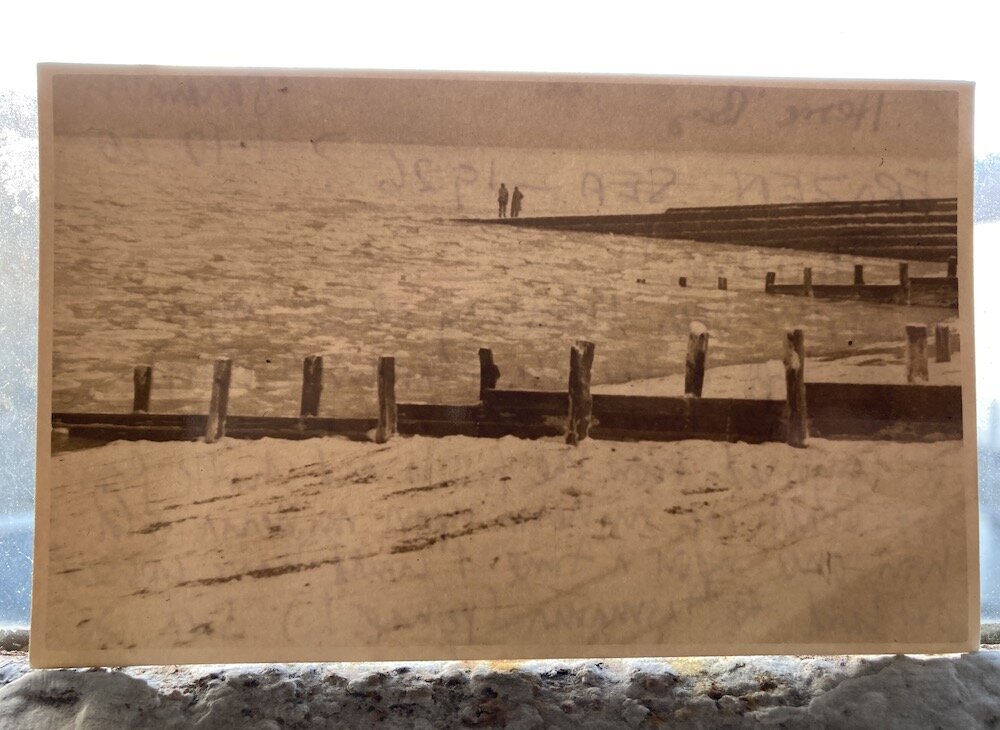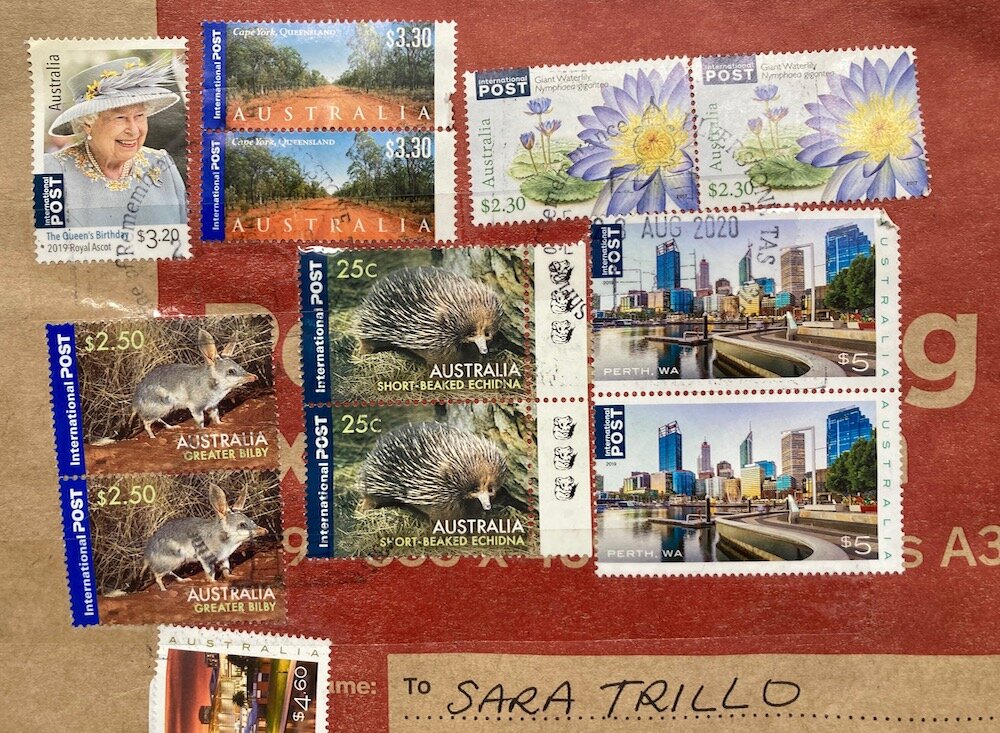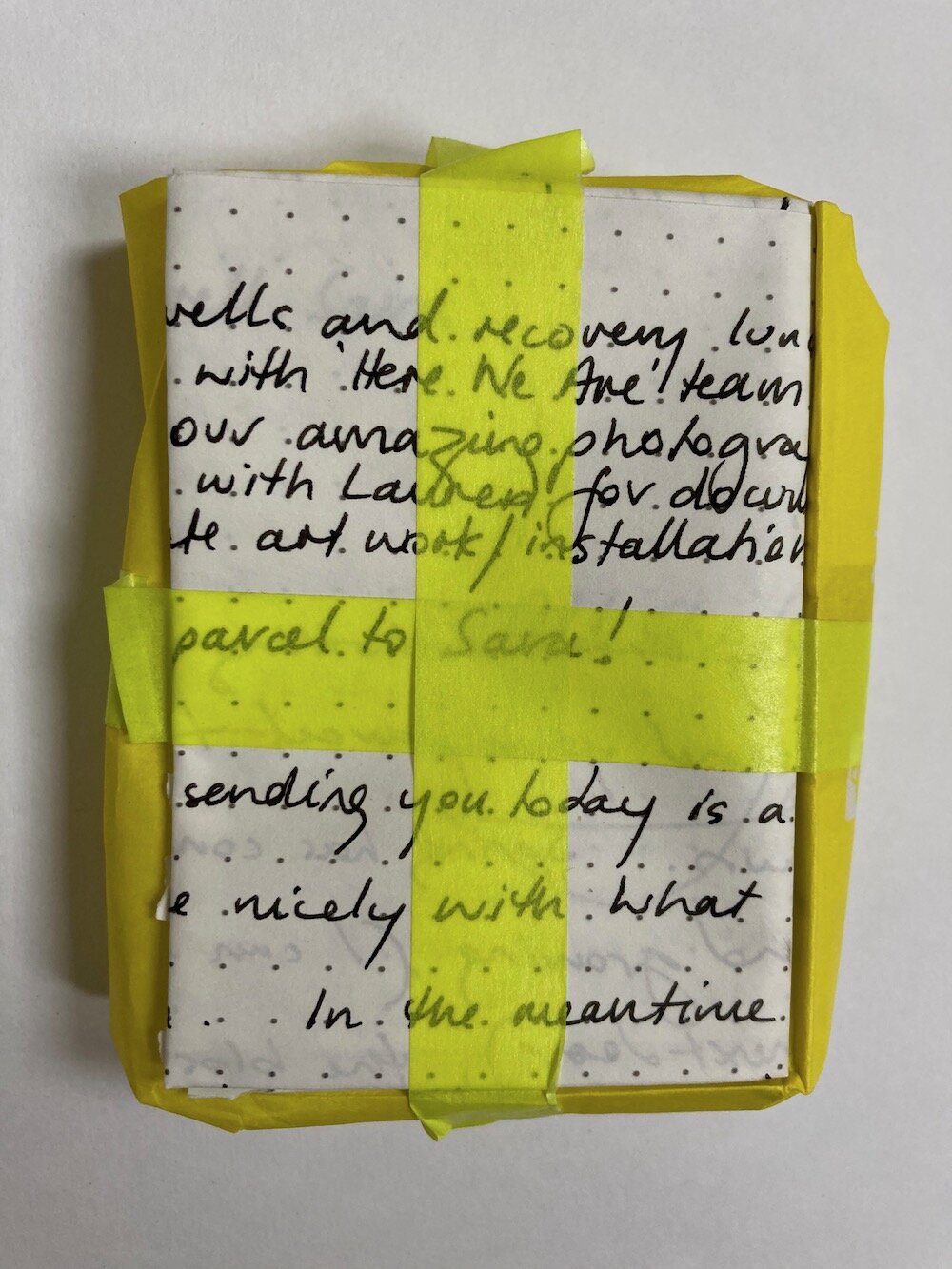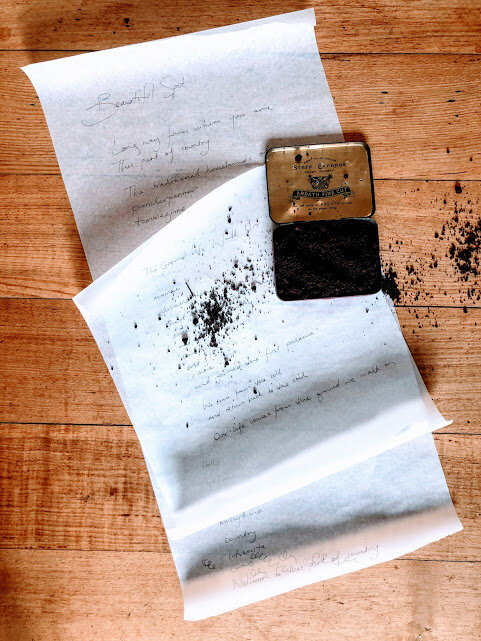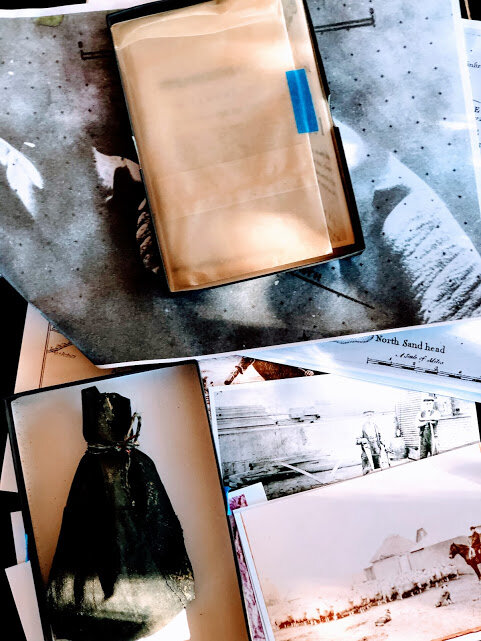Jessie Pangas and Sara Trillo (Tasmania/UK) have been collaborating as part of the Arts Territory Exchange. The artists who both have reflective research-based practices are working with the common themes of: Human time/Ancient time, landscape, place and boundaries.Sara is based in Sandwich, Kent, in the south east of England. She has a history rooted in painting but her practice now combines walking as a research methodology and various interdisciplinary modes of making. She creates work about ancient histories, and settlements, using expeditioning and field trips as part of her practice to search for elusive and overlooked sites within increasingly overpopulated, touristic coastal locations. Sara works with processes of mimicry and re-fabrication often constructing tool-like artefacts using found materials, which speak of archaeological histories both real and imagined. Sara’s parcels, sent to Jessie as part of their collaboration have drawn on the database of artefacts and research from her on-going projects and the substantial archive that informs her practice. Wrapped fossils and memory stick sent fro Sarah to Jessie.
Contents of package sent from Sara to Jessie.
Jessie has a background in Anthropology, turning seriously to art-practice after she found herself back in North West Tasmania (where she was born) after a long period of international travel and upheaval. For the initial stage of the collaboration she deliberately chose to use a different method of making in each of her parcels, each a stand-alone statement, a complete art work or object.Wrapped object sent from Jessie to Sarah.
Their collaboration began with e-mail, and then a zoom exchange, where the artists recognised that despite living in very different parts of the world, they are both connected to their current coastal localities through family ties and a process of settling down after periods of travel.The pair set parameters for their exchange, deciding to send each other a parcel as close to the first day of each month as possible, and that the contents would reflect their practice in some way but with no obligation to respond directly to what they received. The artist have found synchronicity in what they have shared: Across the distance of 10,750 miles they have exchanged sand from the English channel, Tasmanian soil, photographs, and most recently annotated maps of their own locations, each marking particular journeys, favourite walks, ancient sites and foraging spaces (receiving these at the same time with out prior discussion).Detail of an annotated map sent from Jessie to Sarah.
The pair have also shared sound files and video footage from their coastal locations./
The novelty of delay and the act of waiting caused by the postal service set against the speed of global internet communication has proved fruitful for the artists;Jessie Says:''The process of the exchange, mediated by the postal service, has had a tidal rhythm of ebb and flow. This structure and the refreshing limitations of the 2020 global postal pace has allowed time to emerge as a theme of the exchange: Time as a precious commodity, a luxury and therefore the radical act of working slowly (including freedom from the obligation to respond directly and practice the art of receiving/ holding /gestating as well as the freedom of working without a deadline/end goal in place). So far, we have each sent and received four parcels, with a fifth currently in transit. The postage has taken varying amounts of time from a couple of weeks to over a month on one occasion, adding to the gentle pace of the exchange.'' The gentle unfolding of the project across distances, oceans and time zones adds to the layered meanings present already in the artworks and artefacts exchanged. The careful way in which the artists beautifully document each others work speaks of a respectful custodianship, acts of care and 'holding'- the term Jessie uses, which reflect upon each artists relationship to the land they live on as-well as what they produce. Sara and Jessie dig deep in their own location both literally, with acts of excavation and foraging, but also with careful conceptual investigation of the histories of territory and boundaries, both municipal, familial and erased (as with the aboriginal Australian palawa/pakana peoples).Their long distance postal exchange says something about how we choose to share and represent the histories, both material and ephemeral of our respective 'places', navigating both the rooted-ness and precariousness of these histories through making, as a process of understanding and uncovering.The artists have come to a juncture where they are reviewing what the next stage of their collaboration will look like. They anticipate a shift towards responding more directly to the parcels they receive, moving away from the sharing of their own archives toward the development of a shared body of work. They plan to make something ‘physically happen’ in the UK as the result of this dialogue.////////////////////////
Sara Trillo is based in Sandwich, Kent, in the south east of England, and has a studio in Margate. She originally studied painting at Norwich School of Art but her practice now operates within the expanded field, combining research, walking and making. She explores hidden spaces, heterotopias and ancient settlements, making expeditions to find elusive littoral places within increasingly urbanised landscapes and coastal sites. There is a strong narrative component to the work and an interest in archaic processes of fabrication: her output often results in tool-like artefacts constructed with found material. In 2017 Sara became an Associate of Open School East, an experience which exposed her practice to new stimuli and collaborative possibilities. Recent projects since then have included funded production residencies in Arnis, Germany 2018, at Eastside Projects, Birmingham 2019, and PEATS funded research residencies in Cyprus and Turkey, 2017 and 2019. Recent commissions include reviving an ancient rural rush-bearing tradition for Art in Romney Marsh 2019, excavating a reeded boat on Margate sands for MargatNOW 2019, and a current, garden inspired installation “Hortus Conclusus” for “Terra Nexux” at Proposition Studios, London.https://www.saratrillo.co.uk/Jessie Pangas is an artist based in North West Tasmania, Australia who uses installation and archival based processes to explore place and presence in the neglected fringes of domestic and communal space. Through studio and community based projects and events she seeks to cultivate a quieter, slower presence making room for forgotten meanings and unheard voices. Born in Tasmania, know for its wild natural beauty and harsh colonial and industrial history, Jessie has spent most of her life elsewhere, completing high school in India before returning to Australia to study Anthropology and Development at the University of Melbourne. Her early career was spent living and working in the margins, including 4 years in a broad acre housing commission suburb in Tasmania and 3 years in a remote Indigenous community in North East Arnhem Land, N.T., Australia. This diverse experience remains a formational influence in her artistic practice but it was not until returning to Tasmania five years ago that Pangas began to pursue art professionally, graduating from the University of Tasmania's Bachelor of Contemporary Art program with first class Honours in 2018. During this time she has exhibited in a number exhibitions including Right Here Now, Regional Arts Australia’s National Showcase in the Museum of Australian Democracy, Old Parliament House, Canberra as well as in collaborative community projects including the co-creation of Here She Is, a Ten Days on the Island 2019 festival project. Currently Jessie is working on the second iteration of this project Here We Are as well as with Urban Theatre Project’s Shorewell Present … Dear Friend , Burnie and Constance ARI’s House Show 2.0, Hobart/virtual.www.jessiepangas.com+All image rights belong to the artists+Follow the artists on instagram to see more from their exchange.@jessiepanges@Sara_trilllo



